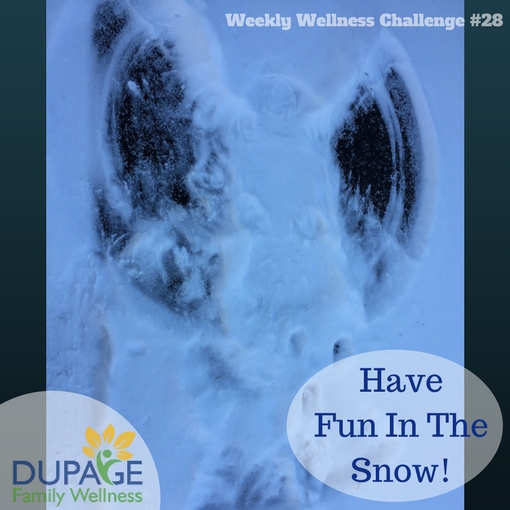 This weekend, I challenge you to HAVE FUN IN THE SNOW!! I remember when I was little, I used to LOVE playing in the snow! What has happened over the years that has suddenly made us as adults so serious and afraid to play? We worry how bad the roads are going to be and how slippery it could be. This weekend, I want you to think about what you could do to enjoy the snow! Here are a few ideas to get you started.
This weekend, I challenge you to HAVE FUN IN THE SNOW!! I remember when I was little, I used to LOVE playing in the snow! What has happened over the years that has suddenly made us as adults so serious and afraid to play? We worry how bad the roads are going to be and how slippery it could be. This weekend, I want you to think about what you could do to enjoy the snow! Here are a few ideas to get you started.
- Make a snow angel…. Or better yet, a MYSTERY snow angel. I love the picture for this article. My mom woke up to this mystery snow angel in her driveway one morning in December. She had no idea where it came from, but found out later that one of her friends snuck over, crept down the narrow tire tracks without making any footprints, and leapt off the tracks to make the snow angel. The angel looked like it must have come from heaven. How fun to surprise one of your friends with a mystery snow angel to wake up to!
Read more ...
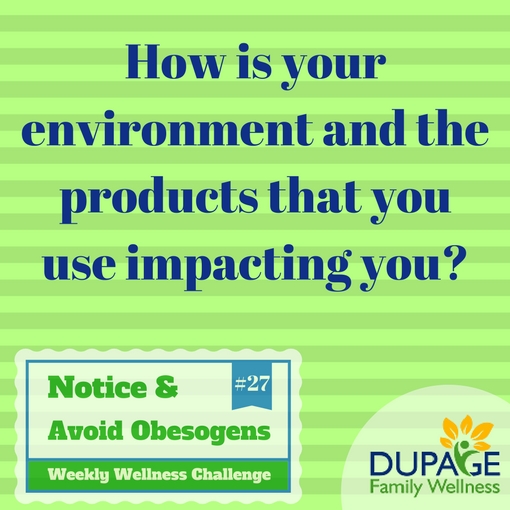 Have you ever heard of an Obesogen?
Have you ever heard of an Obesogen?
It is a subclass of Endocrine (hormone) disrupting chemicals that might predispose individuals to become obese. I know most people think that you become obese over time by consuming more calories than you burn, but this is not the whole story. Other factors, like hormones can come into play. Check out this study.
A researcher exposed one of two groups of mice to a substance called perfluorooctanoic acid (PFOA). Low doses of exposure to this substance led to the exposed group having elevated serum leptin, insulin, and being overweight in mid-life when fed the same diet. If you think that a chemical like this is rare, you would be wrong. It has been commonly manufactured in the US since the 1940s and can be detected in the blood of 98% of the general U.S. population. It has been detected in carpet cleaners, microwave popcorn bags, water, food, and cookware (particularly Teflon). Check out this picture of two of the mice. The mouse on the right is clearly much slimmer than the exposed mouse on the left.
Read more ...
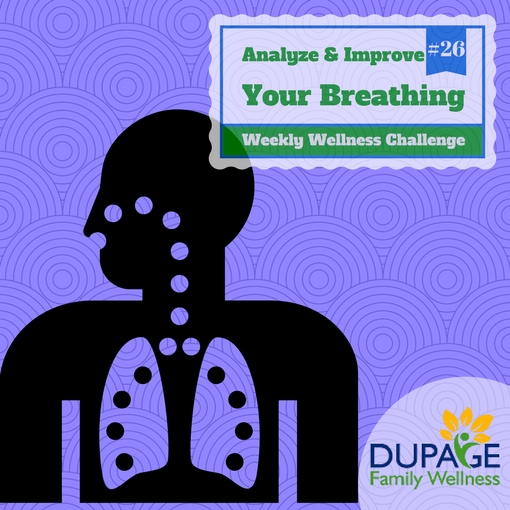
Did you know that breathing properly is crucial to ideal health?
What happens if you aren't breathing properly?
- Proper breathing helps you maintain spinal stability while improper breathing often leads to instability through the spine and pelvic floor.
- Improper breathing can lead to poor coordination and poor cardiovascular endurance.
- Using accessory muscles to help with breathing can lead to problems with shoulder mechanics
- Faulty respiration mechanics can lead to recurrent back pain.
- Improper breathing can play a major role in chronic fatigue, anxiety, panic attacks, as well as many musculoskeletal symptoms.
Read more ...
 Every day patients tell me the conditions they have been diagnosed with. The conditions range from plantar fasciitis to disc herniations, to irritable bowel syndrome. Often patients are attached to their diagnosis and feel as though once diagnosed, the condition is a permanent part of their story. This does not always have to be the case. If you have been diagnosed with a condition, for the rest of this article, forget about your diagnosis, and step back to evaluate how your basic body systems are functioning.
Every day patients tell me the conditions they have been diagnosed with. The conditions range from plantar fasciitis to disc herniations, to irritable bowel syndrome. Often patients are attached to their diagnosis and feel as though once diagnosed, the condition is a permanent part of their story. This does not always have to be the case. If you have been diagnosed with a condition, for the rest of this article, forget about your diagnosis, and step back to evaluate how your basic body systems are functioning.
Even if you don't have any diagnosis, it is important to make sure all your body functions are working well. When one of your basic functions is not optimal, it can lead to problems in the future.
Read more ...
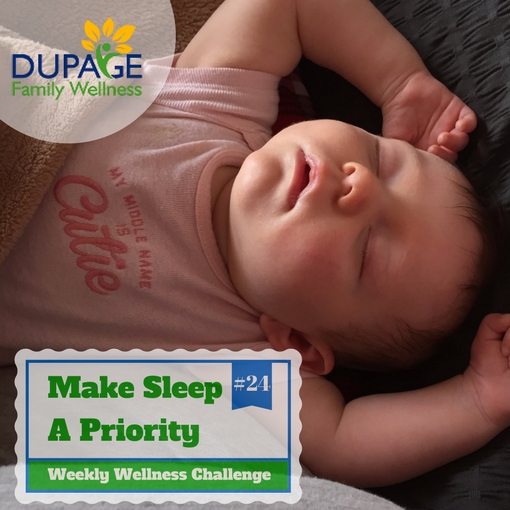
How many hours of sleep do you get each night?
The average adult requires 7-9 hours depending on their circumstances and genetics, but most Americans are not getting this.
Nearly 1/3 of adults get less than 6 hours of sleep per night. More than a third of Americans have trouble sleeping every night while over half report sleep problems at least a few nights a week. The use of have also dramatically increased in recent years.
The average number of hours American's sleep now is down to 6.8, which is over an hour less than it was in 1942.
Without adequate sleep, you cannot be healthy.
Sleep is essential for basic repair of systems in the body including neurological, endocrine, immune, musculoskeletal, and digestive. Have you ever noticed that you get a cold or flu after not sleeping well for a few nights? Melatonin (one of the main hormones controlling your circadian rhythms) increases immune system function to protect you from infections.
Sleep is crucial for
Read more ...
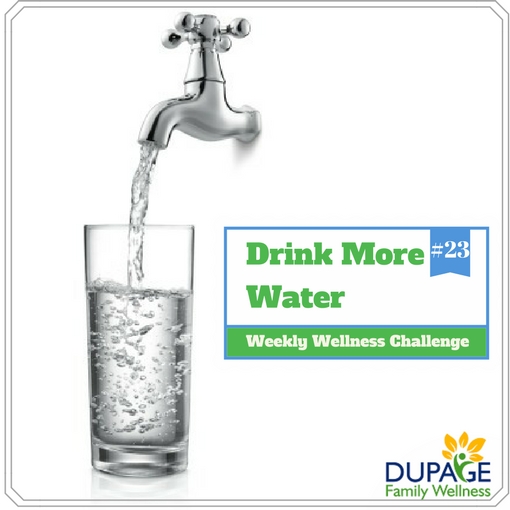
Water is the most abundant liquid on our planet. It makes up more than 70% of the earth’s surface. Your body is approximately 60% water. Yet, you may not be drinking enough water each day.
The fluids in your body have many functions. These include digesting food (prevents constipation), flushing out toxins, moistening tissues such as eyes, throat, and nose, lubricating joints, circulating blood, creating saliva, transporting nutrients, and maintaining body temperature.
How do I know If I'm dehydrated?
Your urine should be pale yellow in color if your are healthy and drinking enough water. When you are dehydrated, your urine has a strong odor, and is yellow or darker in color. This means that it is concentrated and your body is getting rid of waste, but doesn’t have enough water to flush it out.
If you feel thirsty, your body is telling you that you are already dehydrated. Some symptoms of severe or chronic dehydration are muscle pain, low back pain, headaches, constipation, dry itchy skin, nose bleeds, sinus pressure, fatigue, craving sweets or hunger after eating, sticky roof of mouth, low blood pressure, dizziness with standing, muscle cramping, rapid heart beat, and repeated urinary tract infections.
Read more ...
 This weekend, I challenge you to HAVE FUN IN THE SNOW!! I remember when I was little, I used to LOVE playing in the snow! What has happened over the years that has suddenly made us as adults so serious and afraid to play? We worry how bad the roads are going to be and how slippery it could be. This weekend, I want you to think about what you could do to enjoy the snow! Here are a few ideas to get you started.
This weekend, I challenge you to HAVE FUN IN THE SNOW!! I remember when I was little, I used to LOVE playing in the snow! What has happened over the years that has suddenly made us as adults so serious and afraid to play? We worry how bad the roads are going to be and how slippery it could be. This weekend, I want you to think about what you could do to enjoy the snow! Here are a few ideas to get you started. 

 Have you ever heard of an Obesogen?
Have you ever heard of an Obesogen? 
 Every day patients tell me the conditions they have been diagnosed with. The conditions range from plantar fasciitis to disc herniations, to irritable bowel syndrome. Often patients are attached to their diagnosis and feel as though once diagnosed, the condition is a permanent part of their story. This does not always have to be the case. If you have been diagnosed with a condition, for the rest of this article, forget about your diagnosis, and step back to evaluate how your basic body systems are functioning.
Every day patients tell me the conditions they have been diagnosed with. The conditions range from plantar fasciitis to disc herniations, to irritable bowel syndrome. Often patients are attached to their diagnosis and feel as though once diagnosed, the condition is a permanent part of their story. This does not always have to be the case. If you have been diagnosed with a condition, for the rest of this article, forget about your diagnosis, and step back to evaluate how your basic body systems are functioning. 
